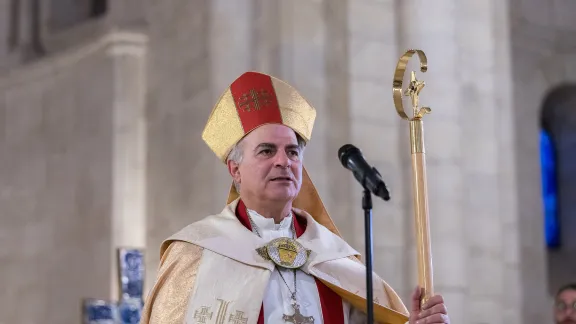In this Voices from the Communion, Bishop Azar talks about the impact of the Israel-Palestine conflict on the Palestinian Christians, diaconal work, and how to preach hope during times of war.

Bishop Sani Ibrahim Azar. Photo: LWF/Albin Hillert
Bishop Sani Ibrahim Azar, Evangelical Lutheran Church in Jordan and the Holy Land
For over six months now, the country in which Bishop Sani Ibrahim Azar lives has been at war. His church, the Evangelical Lutheran Church in Jordan and the Holy Land (ELCJHL), belongs to the small Christian minority living in Israel and Palestine. In Voices of the Communion, Azar talks about the impacts of the Gaza war on his congregations, the role of his church and how it is possible to talk about resurrection during a war.
Bishop Azar has just returned from a parish visit: in Bethlehem he went to see 200 orphans from Gaza, whom the church was able to evacuate from Rafah through German connections and assistance from the organisation SOS Children’s Villages. The five-to-seven-year-olds “are glad to be out of Gaza but are now experiencing a completely new world,” the bishop reports.
While the Bethlehem congregation is still looking for a school to accept so many new pupils at the same time, the orphanage in Rafah is full again, he continues. “So many children there are wandering alone through the streets,” he says. The ELKJHL would like to take care of them but at present not even medical assistance is getting into the Gaza Strip. “It’s impossible right now.”
Friendships destroyed
The war can be felt everywhere, the bishop notes. “When I go into a Jewish shop today the people barely say ‘hallo’. They used to ask me how my children were getting on”, he explains.
The streets in the Jerusalem old city, otherwise crowded with visitors and pilgrims at Easter, are comparatively empty. “Just look around, this isn’t Easter,” he says. Even the shopkeepers are not as lively as usual. “They are all withdrawn.” Normally he receives a lot of invitations in Ramadan, but not this year. The Muslim month of fasting, a bit like Advent in Christianity, is overshadowed by the war.
The traditional Maundy Thursday procession of the Lutherans in Jerusalem, leading from the Church of the Redeemer in the Old City to the Garden of Gethsemane with the Lord’s Supper and prayers, was very small this year. Not only the visitors stayed away − his own church members in the West Bank did not receive permission from the Israeli military authorities to come to Jerusalem for the service. “Maundy Thursday was always the celebration that we all attended together,” says Azar. “This time 30 to 40 people were missing.” That is noticeable in a congregation with just 300 members.
Unemployment and emigration
More and more Christian families are leaving the country. “They are afraid and no longer feel safe,” says Azar. The Arab Christians are a constantly dwindling minority. When a family departs that means “8 to 20 people,” which leaves a noticeable hole in the small congregations.
Recently a 17-year-old schoolgirl, who is a Palestinian Christian with an Israeli passport, was called up for Israeli military service. Most of the bishop’s parish members have had no income since the beginning of the Gaza war. They had worked as bakers, bus-drivers or green-grocers, or run travel agencies. The war has driven the tourists away, he repeats.
Being with the people
In spite of this depressing situation Bishop Azar sees opportunities for action. “It is important to be with the people, to accompany them,” he says. At Easter, the ELKJHL’s diaconal center helped about 100 families with meat for a traditional Easter meal, which they would otherwise not have been able to afford. “Many have not eaten meat for weeks but you only find that out when you talk to people.”
Many parents can no longer afford the school fees for the church schools in Beit Jala or Beit Sahour. The children attend lessons all the same – Christians and Muslims together. “We have to keep the schools open. We have to make a contribution to tolerance and living together,” Azar underlines.
He is particularly grateful for the work of the Augusta Victoria Hospital, the bishop adds. The hospital in East Jerusalem, which specializes in cancer and kidney diseases, is run by the LWF and forms a pillar of the Palestinian health system. More than once the bishop was able to refer members of his congregation with cancer to it, quickly and unbureaucratically. The hospital continues to accommodate cancer patients from Gaza. When it is possible get back into Gaza he, with his church, would like to start a diaconal project for the children who have lost their parents through the war. “That is our place – our church originally started here with diaconal activities!”
Hope that remains
How do we talk about hope and resurrection in times like these? Together with other churches in Jerusalem, the ELKJHL called for an end to the violence in the Gaza Strip during Holy Week. In worship services he includes the Israeli military in the intercessory prayers – in spite of the suffering that soldiers have caused in his own parish as well.
At this time, the Easter message is more important than ever, says Bishop Azar: “That is the only hope we have. The hope that after Good Friday comes Easter. The hope that all this will one day come to an end.”
The conversation took place on Maundy Thursday in Jerusalem


